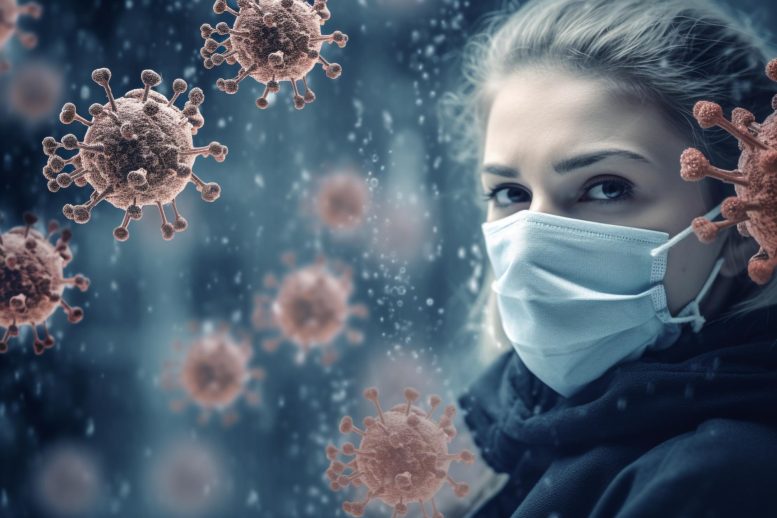
Researchers on the College of São Paulo have discovered that cognitive impairments similar to reminiscence loss and a spotlight deficits persist in each extreme and gentle COVID-19 instances lengthy after preliminary an infection, impacting each day functioning. Their research, involving 302 volunteers, reveals a major want for cognitive rehabilitation methods to deal with these long-term results, as even sufferers with gentle signs confirmed appreciable cognitive challenges. Credit score: SciTechDaily.com
Analysis signifies that whereas probably the most extreme results of SARS-CoV-2 have been noticed in sufferers with acute COVID-19people who skilled milder instances and weren’t hospitalized additionally reported signs of reminiscence loss and a spotlight deficits lasting over 18 months post-infection.
Reminiscence loss and a spotlight deficit are frequent complaints amongst extreme COVID-19 survivors. Nonetheless, these and different cognitive impairments have additionally been noticed in sufferers with gentle instances greater than 18 months after an infection, in response to a research by researchers on the College of São Paulo (USP) in Brazil.
An article on the research is printed within the journal BMC Psychology, The findings spotlight the necessity for extra complete rehabilitation to deal with the enduring cognitive impacts of lengthy COVID, the authors write.
Information collected from 302 volunteers pointed to cognitive impairment in 11.7% of gentle sufferers, 39.2% of average sufferers, and 48.9% of extreme sufferers.
“Though the injury achieved by the illness by way of reminiscence loss, consideration deficit, and gradual processing will increase in proportion to its severity, the identical issues have an effect on a removed from a negligible variety of folks – round 100 in our research – who had gentle or average COVID,” stated Antonio de Padua Serafim, first creator of the article and a professor on the Institute of Psychology (IP-USP).
The outcomes of the research, which was funded by FAPESP, proof the potential influence of neuroinflammation attributable to an infection by SARS-CoV-2.
“Reminiscence loss and a spotlight deficit are identified to be related to post-intensive care syndrome attributable to intubation below deep anesthesia. A few of the information analyzed within the research, nonetheless, was from sufferers who did not require intensive care or did not even have adequate signs to be hospitalized and however exhibited reminiscence loss and a spotlight deficit. The findings due to this fact opened our eyes to the query of neuroinflammation attributable to COVID-19,” Serafim stated.
Reminiscence and a spotlight are essential cognitive capabilities that have an effect on folks’s day-to-day lives. Reflecting this, members within the research with poor reminiscence and a spotlight take a look at scores reported difficulties with recalling phrases or performing routine actions, similar to forgetting pots on the range or failing to choose up kids up from faculty.
“Hierarchically talking, consideration is the first operate in all psychological exercise, and this explains why consideration deficit has such a huge effect on folks’s each day lives. Excessive-quality consideration is required to suppose and act in numerous methods on the identical time. Impairment of consideration in flip impacts reminiscence. In some instances, attentional exercise is so dispersed that every new stimulus (or impeding exercise) dissolves, in order that the particular person cannot keep in mind what they have been doing. This additionally impacts processing exercise, which includes speedy decision-making primarily based on info,” he stated.
cognitive rehabilitation
Based on Serafim, all of the proof has proven for a while that SARS-CoV-2 can have an effect on the central nervous system in addition to the lungs, kidneys, coronary heart, and muscle tissues, however the extent of the injury it might trigger is poorly understood. “We do not know if cognitive impairment attributable to COVID-19 is everlasting, and we’re at present evaluating methods to intervene on this course of,” he stated.
In partnership with different researchers at USP, Serafim is growing applications to attempt to mitigate the cognitive losses brought on by COVID-19. The intention is to seek out out whether or not methods similar to neurostimulation and neurofeedback can attenuate or reserve reminiscence loss and a spotlight deficit.
“Each are non-invasive methods that intention to enhance mind capabilities via neuromodulation, which may stimulate the connections amongst neurons within the mind (Synapses, We’ve solely case research up to now. For instance, within the case of a doctor who was within the intensive care unit for 34 days, we carried out a neurofeedback protocol usually used to check sufferers with consideration deficit dysfunction, and he made a great restoration. However that was an remoted case,” he stated.
“Primarily based on the data we have acquired up to now relating to cognitive stimulation and rehabilitation methods, I consider it might be doable to acquire an enchancment in neural connectivity via mind coaching to stimulate total cognitive capability. The extreme part of the pandemic is over, however the sequelae persist. So it isn’t a closed case. Many individuals have been contaminated, and lots of have sequelae of this sort. Nonetheless, we do not have an efficient program to intervene not solely within the emotional features but in addition within the cognitive difficulties ensuing from COVID-19.”
Reference: “Cognitive efficiency of post-covid sufferers in gentle, average, and extreme scientific conditions” by Antonio de Padua Serafim, Fabiana Saffi, Amanda Rafaella A. Soares, Alessandra Mara Morita, Mariana Medeiros Assed, Sandro de Toledo, Cristiana CA Rocca and Ricardo SS Durais, 26 April 2024, BMC Psychology,
DOI: 10.1186/s40359-024-01740-7
The research was funded by the São Paulo Analysis Basis.






